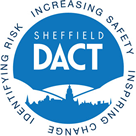New Domestic and Sexual Abuse Strategy for Sheffield Launch 26th November 2018
October 30, 2018
New Domestic and Sexual Abuse Strategy for Sheffield
Preventing violence, abuse and harassment is everyone’s business
Strategy Launch 26th November 2-4.45pm 2018 Sheffield Town Hall
Come and hear about new developments and good practice in addressing domestic and sexual abuse and violence against women and girls in Sheffield.
All welcome but spaces may be limited so contact dact@sheffield.gov.uk to book your place
Domestic and Sexual Abuse affect many people each year in Sheffield. Over 18,000 people (aged 16- 59 years) are estimated[1] to have been a victim of domestic abuse in Sheffield in the last 12 months.
Between 5,000 and 9,000 people (aged 16-59 years) are estimated to have been victims of sexual abuse or rape in Sheffield in the last 12 months.
We estimate that over 17,000 children are living in a household where domestic and sexual abuse is present.
But we know in reality, that these estimates are likely to be higher. We know that domestic and sexual abuse doesn’t stop at the age of 59; we know that confidence in reporting, especially of sexual violence, is still an issue. Whilst there were 12,029 incidents of domestic abuse reported to the Police in 2016/17 national data suggests a significant proportion of incidents of domestic and sexual abuse are not reported.
We have specialist services in the city but a victim / survivor seeking help may go first to their faith leader, their GP, their child’s teacher or a friend or family member. Many of us have been asked for help by someone we know but have felt unsure, inadequate, or torn between friendship and family loyalties. Many of us have witnessed abusive behaviour ourselves and found it hard to say something. Many of us have been abused and felt unsupported by the people around us.
We need to make domestic abuse a priority for ‘everyone’ including all staff and volunteers in agencies and organisations and those working in health and public health services[2]. Equipping them so that abuse is identified early and people feel they can disclose. We need workers to feel confident when working with victims so that they are able to respond appropriately. We need workers across the city who can listen to someone who wants to talk about their experience of abuse, who can sensitively ask the right questions, who can understand the risks they are facing, who can offer immediate support if safe to do so and help to signpost or refer people to the right services if they need them.
Our ambitions set out in our new strategy remain that Domestic and Sexual Abuse, and all forms of violence against women and girls will not be tolerated in Sheffield and we believe that every individual and all agencies have a role to play in spreading this message.
No one should have to live in fear of violence, abuse or controlling behaviour in their relationship or family.
No one should think it acceptable to perpetrate violence against anyone.
No child should grow up in a home where violence or abuse is an everyday occurrence.
No woman or girl should have to put up with sexual harassment in our streets and public places
We have identified our five priorities for Sheffield.
In this strategy we will:
- bring about culture change so that preventing domestic and sexual abuse is understood to be everyone’s business
- work towards eliminating violence against women and girls
- ensure our services are of a good quality, promote safety and support recovery from abuse, so that people affected by abuse can achieve their full potential
- develop whole family working that supports victims and holds perpetrators to account
- tailor services to ensure support for the most vulnerable and those with complex needs
[1] Sheffield Domestic and Sexual Abuse Needs Assessment 2017 http://sheffielddact.org.uk/domestic-abuse/resources/danac/
[2] The national VAWG strategy has ‘Make early detection and prevention a priority for the health and public health services, and mainstream this into the work of all health professionals’, as one of its key outcomes for its early intervention and prevention theme, VAWG strategy page 26



